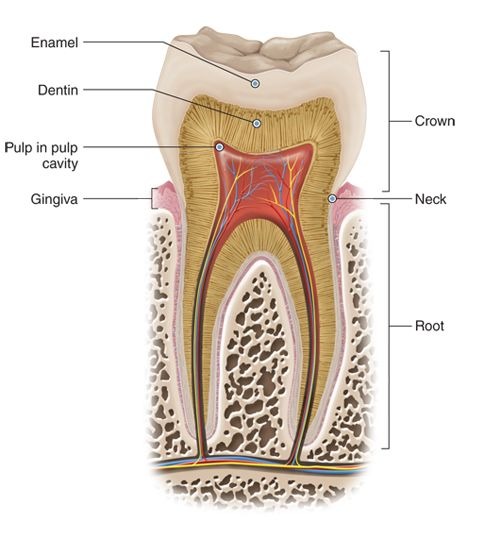Zingers
Hydrogen peroxide is the active ingredient in Zoom in-chair whitening, and also in the majority of teeth whitening products.
Hydrogen peroxide works by releasing free oxygen radicals which then break down the organic material (which is causing the staining) on the tooth surface, as well as any organic material within the enamel layer of the tooth. When the free radicals extend into the enamel of the teeth it can cause zingers in some individuals.
Tooth Sensitivity
Tooth sensitivity (not zingers), after tooth whitening is usually as a result of
- crack in a tooth
- gingival/gum recession
- undiagnosed cavity/hole in a tooth
- failure of an existing restoration
The enamel layer of the teeth is a protective layer. If the enamel layer is damaged or worn away it exposes the dentine layer. The dentine layer is made up of tubules. These are like spaghetti tubes, with tiny holes extending down the length of them. These tubules communicate with the pulp, which is where the nerves of the tooth are found.

Any damage to the enamel layer of the tooth will mean that the whitening gel may come into contact with the nerve of the tooth, causing sensitivity.
How to minimise the risk of Zingers and sensitivity after in chair teeth whitening
A comprehensive dental exam will identify any risk factors that need to be addressed prior to tooth whitening.
-
Teeth with decay/hole should be cleaned and the tooth restored with a dental filling to seal and protect the nerve.
-
Teeth with cracks may/may not require further treatment such as a restoration or crown. This would depend on how extensive the crack is.
-
Teeth with gingival/gum recession should be treated with desensitising medicants (sensitive toothpaste or desensitising gel) for two weeks prior to whitening treatment.
-
As a general precaution, we recommend all patients planning on having Zoom Teeth Whitening should use desensitising toothpastes and gels before treatment.
As part of your Zoom! Teeth Whitening experience
-
We get you to use a specialised desensitising toothpaste or gel for two weeks before treatment
-
We advise you to take Ibuprofen prior to your treatment
-
We cover your gums and sensitive areas of your teeth with a protective barrier, so they aren't in contact with the whitening gel.
-
Straight after your whitening treatment, we get you to wear your custom-made trays with Relief Gel and take over-the-counter pain relief as necessary to prevent Zingers
-
Despite our best efforts, some individuals will still have sensitivity following their appointment. The good thing is that this resolves within 24-48 hours
Wanting whitening, but have a history of Zingers?
Here at Profilo Dental we have you covered.
HiSmiles Professional is an alternative in-chair teeth whitening product that can guarantee a pain-free experience that produces the most natural, healthy shade of white possible for patients.
Hi Smiles Professional uses Phthalimidoperoxycaproic acid (PAP). This is in place of hydrogen peroxide. No free radicals are released, therefore no zingers. If PAP comes into contact with the soft tissues it will cause no damage. This is in comparison to hydrogen peroxide which requires a protective barrier to be placed to prevent chemical burn to the soft tissue.

